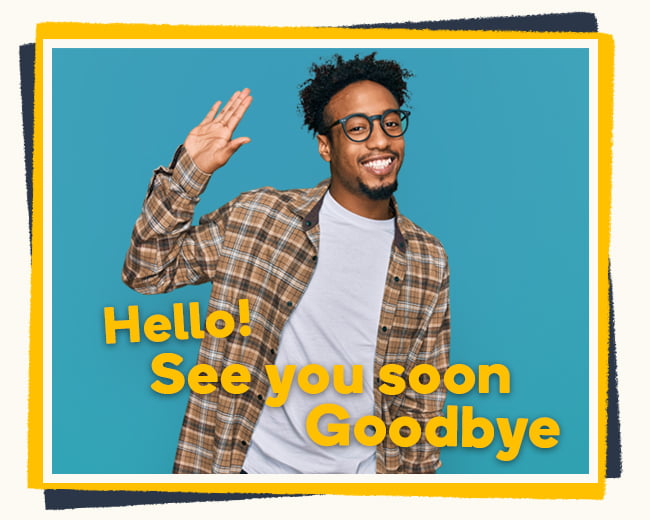Greetings are one of the first things we want to learn when we’re learning English. It’s a great place to start - it’s the first thing we’ll have to say to someone when we first meet them and we’re trying to have a conversation.
Keep reading to learn more about the different ways to greet someone in English. You probably have questions of your own - are there formal greetings in English? Do I greet elders in English differently?
Well, let’s get into it!
Hello! Greetings to use when you first meet someone
When you first meet someone, you want to make a good impression. Saying a warm greeting is a good start - here are a few ways you can greet someone in English:
Hello!
This is the most basic form of greeting that you can use with anyone you meet.
Hi!
This is a shortened, bit more informal version of “Hello!”. Being casual can help you come across as more approachable to acquaintances, colleagues, and even strangers you just met at a party.
Here’s a video from the Memrise app of how a native speaker would say it:
Hi!
Good morning!
Say this when you want to greet someone in the morning. It’s a very common greeting which you can use with anyone… as long as it’s before 12:00PM
Morning!
A shortened version of “Good Morning!” it’s the informal version of this greeting. If you’re going to use it, say it with a lot of warmth and enthusiasm, which implies that it’s actually a good morning.
Here’s a video from the Memrise app of how a native speaker would say it
Morning!
Good Afternoon
Once the clock strikes noon, it’s time to switch to another phrase. Similar to “Good Morning”, you can also say “Afternoon!” as an informal greeting (with the same sort of enthusiasm we talked about for “Morning!”).
Good Evening
You’ve probably guessed it, “Good evening” is the greeting to use at night. Again, you can say “Evening!” as an informal version.
If you’re a beginner, and the greetings that depend on the time of day are confusing, just go back to saying “Hello!” or “Hi!”.
Come in
This is the greeting you use to invite someone into your home, the place you’re staying, or whenever someone knocks on the door of the room you’re in. You usually use “come in” in English after you’ve said “hello”.
Business greetings in English
All the formal greetings above can be used in a business setting. There may be some colleagues or clients that prefer to greet more informally, but it’s always better to be more formal on the safe side, especially if you don’t know them too well.
Slang greetings in English
Like any language, there are slang greetings in English that you can use in informal settings. Use this with friends, family, and anyone that you feel comfortable being more casual with.
Try these slang greetings in place of “Hello!”:
- Hey! (UK or US)
- You alright? (UK)
- What’s up? (US)
Here’s how it sounds like when an American says it:
What’s up?
Bye! Phrases to use when you’re leaving
When you say goodbye to someone in English, you want to part ways in a friendly and upbeat manner. Like all greetings in English, there are a few ways you can say goodbye:
Goodbye!
This is the most basic and common phrase, and can be used at any time of the day, with anyone.
Bye!
This is the same as “Goodbye!”, but is a more informal option. You can also say this to anybody, not just friends or colleagues.
Here’s a video from the Memrise app of how a native speaker would say it:
Bye!
See you soon!
This is another way of saying goodbye, but “See you soon” in English is a phrase you’d normally use with friends and family, or people you meet often. It’s more endearing as it suggests that you want to see them again.
See you later!
This is another way of saying “See you soon” in English, and you can use it at any time.
Check out how a native speaker would say it in this video from the Memrise app:
See you later!
See ya!
This is the casual form of “See you soon!”. You’d usually only use this with friends and family.
Take care
In English, you can use this when saying goodbye to someone as an expression of warmth and affection - you’re telling them to be careful and to look after themselves until you see them again.
Take care
Have a nice day
Like “Take care”, this is an expression you’d use as well as “Goodbye” when leaving someone. You can also say “Have a good day”.
Listen to how a native speaker would say this in a video from the Memrise app:
Have a nice day
Goodnight
Say this when you want to say goodbye to someone in the evening - usually after 7 p.m.. It’s very common and you can use it with anyone.
Night!
This is the shortened version of “Goodnight”, and is mostly said with an enthusiastic and friendly tone to people you know.
Motivated to start learning English? Give it a go and start an English course with Memrise now!
English phrases to use when you need to be polite
There are many forms of politeness in English - here are some of the most common ones:
Thank you
This is one of the most important phrases you’ll be saying as an expression of politeness in English. You can use it to show your appreciation for the big and small things people do for you - from cooking you a meal to lending you money. It’s perfect for both personal and professional situations.
Thanks!
This is the same as “Thank you”, but is a quicker way of saying it. You’d normally use this for smaller things, like someone making you a coffee or holding a door open.
Here’s a video from the Memrise app of how a native speaker would say it:
Thanks!
Cheers!
When you’re learning English, this one can be confusing. It’s the phrase used in English to toast with a drink; but in British English it’s also a way of saying “Thank you", so don’t be surprised if you’re in the UK and hear it said a lot. You can give it a go if you’re comfortable - it’ll help you sound more like a local! But you may want to try it first on people you already know.
You’re welcome
This is the response you need to use after someone has said “thank you” to you.
Our video on the Memrise app explains how a native speaker would say it:
You’re welcome
No problem
This is another way of saying “you’re welcome” or “with pleasure” in English. It’s more informal.
Here’s a video from the Memrise app of how a native speaker would say it:
No problem
Celebrating in English: Christmas, New Year, Anniversaries and Birthday Greetings
When you’re celebrating with people on important occasions throughout the year, there are certain phrases in English that will help:
Happy birthday!
On someone’s birthday, you simply wish them “happy birthday” in English. It’s also the only words you really need to know to sing the “Happy Birthday” song, which is usually sung just before a birthday cake is cut.
Happy anniversary!
Say “happy anniversary” in English to send well wishes to those who are celebrating the anniversary of an important moment. This phrase is most commonly used on a couple’s anniversary of their relationship or wedding, but it can also be used to celebrate other joyful anniversaries such as when remembering how long someone has worked at the company.
Merry Christmas!
This is a celebratory phrase used for Christmas in English, and wishing someone a fun and enjoyable time. You can also say “happy Christmas”, and can say this at any point during the holiday season. It’s similar to “happy holidays”, but is more specific to the Christian faith. You can also talk about ‘Father Christmas’, which is another way of saying Santa Claus or St Nicholas in English.
Here’s a clip from the Memrise app of how a native speaker would say it:
Merry Christmas!
Happy Holidays!
Similar to “Merry Christmas”, it’s a greeting that is used more in America during the holiday season that is more inclusive to other cultures and traditions.
Here’s a clip from the Memrise app of how a native speaker would say it:
Happy Holidays!
Happy New Year!
It’s very easy to wish someone a happy new year in English at the end of New Year’s Eve or on January 1st - you simply say “Happy New Year!”.
Here’s a video from the Memrise app of how a native speaker would say it:
Happy New Year!
English phrases to use when you offer condolences or show support to someone
If you want to support someone during a good or bad experience, here’s what you can say:
Best wishes
You can say “best wishes” in English in a number of situations - usually at meaningful times in someone’s life, like their wedding or at the start of a new job. It’s also a phrase you can use to sign off your emails. This is both appropriate for personal and business use.
Good luck
You use “good luck” in English when someone is trying something new, making a fresh start or taking part in a competition. Sometimes, people will use “good luck” in a sarcastic manner to express how impossible something is, as in “good luck trying to do that impossible task!”. Probably best not to use it in a sarcastic tone yourself when learning English, but be aware when someone uses it in a sarcastic tone.
I’m sorry
You can use “I’m sorry” on two occasions.
The first is when someone has experienced something tragic you want to express your condolences in English.
The second, the more common scenario, is when you want to apologise. You can say this after you’ve realised you made a mistake, or also say it when you bump into someone on the streets. Even when it’s not your fault, native speakers tend to say “I’m sorry” to show that it was an accident and there was no intention to hurt the other person.
Here’s a video from the Memrise app of how a native speaker would say it:
I’m sorry
So there you have it - all the key phrases in English you need to get through the day, or year, from start to finish! Once you’ve learned and practised these greetings and phrases, you’ll not only be able to start conversations with English speakers, but you’ll leave a great impression on them as well.
If you want to learn even faster and improve your English even more, why not download the Memrise app now and start learning to speak like a local? You’ll learn real-world language skills using audio and video clips of real native speakers, saying the words and phrases you learn in different situations. Our courses are fun, addictive, and you’ll quickly gain the language skills you need to survive - and thrive - in the real world.
Give it a try, you’ll easily go from learning to actually speaking in a new language faster than you thought possible.









